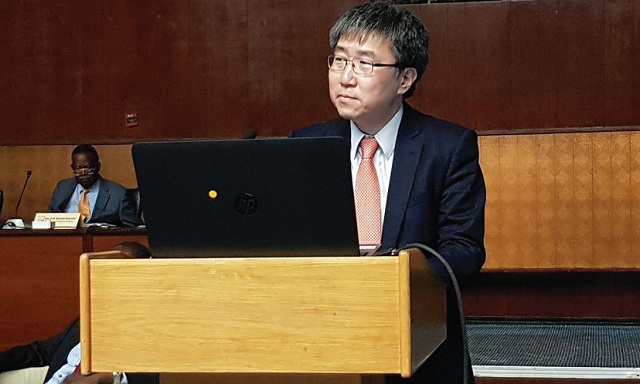
But should Dr. Ha – Joon Chang’s push for more state intervention in the economy be the future?
Kampala, Uganda | JULIUS BUSINGE | The guest speaker at the Bank of Uganda’s flagship annual lecture series; the Joseph Mubiru Memorial Lecture, is usually a distinguished individual in the field of finance, political economy, business, or general management.
Over 25 years, the lecturer series has had distinguished guest speakers like Prof. Ali Amin Mazrui, Michael Camdessus, Duvari Subbarrao, Trevor Manuel, Paul Collier, Joseph stiglitz, Cyril Ramaphosa, Mamphele Ramphele, Patrick Njoroge, Baroness Lynda Chalker, and Ugandans like Prof. Ssemakula Kiwanuka and Dr. Suleiman Kigundu.
To this distinguished list this year was added, Dr. Ha – Joon Chang. Unlike many of the others, Chang who has been ranked among the `Top 20 World Thinkers’ is not a household name in Ugandan scholarship.
His books, including prominent ones like `The Political Economy of Industrial Policy, Kicking Away the Ladder, Bad Samaritans, 23 Things They Don’t Tell You About Capitalism, and Economics: The User’s Guide’ may have sold millions of copies around the world and been translated and published in about 40 languages and 43 countries, but Chang gained prominence only after his name was mentioned as this year’s guest. Perennial participants scrambled to place him. And the lack of familiarity with Chang’s positions showed during the discussions at the event on Dec.01 in Kampala.
Held at the Serena International Conference Centre in the middle of town, the event attracted the usual financial sector A-class and their aspiring disciples.
That Chang was introduced as a “Reader in Political Economy of Development in the Faculty of Economics at the University of Cambridge” did not illuminate matters. Many attendees were unfamiliar with the title and the prestige – awarded only on the basis of distinguished international scholarship – associated with it.
Fortunately, Chang adopted a provocative, challenging, and visionary approach to the topic of ‘Ambition, Pragmatism and Imagination; Rethinking the role of the State in Economic Development’.
Of course, as a distinguished proponent of the so-called “institutionalist political economy”, Chang was expected to place institutions at the centre of economic evolution and in opposition to the laissez-faire economics that glorify the private sector. That is probably why he was invited, since the mainstream tendency now appears to be more inclined towards increased state intervention in the economy.
But Chang approached in a fresh and provocative style; telling his audience of policy makers, shapers, and users to move beyond reliance on nature, create new comparative advantages instead of depending on existing ones, and to reshape an outward-looking economy with a focus on technology, manufacturing, and exports.
“You need to be ambitious in terms of your final goals,” he said, “Dare to imagine a different future.”
But he also said the policy makers need to be pragmatic without being “dull and boring”.
“You can be truly pragmatic only when you can liberate yourself from the shackles of ideological prejudices, conventional wisdom, and historical myths.
“You need to be realistic about what you can achieve in the short- to medium-run,” he said. “You also need to be very pragmatic about the policy tools you use.”
The same policy makers that Chang addressed have, in the last 30 years, emphasised free market or laissez faire economics.
But Chang said it was time for more state protection of domestic industries against competition from superior foreign producers. He said they need export subsidies, lowering of tariffs, and offering rebates on industrial inputs, and strictly controlling quality of exports.
“All of today’s rich countries, except for the Netherlands and (pre – World War I) Switzerland, used protectionism for substantial periods in order to develop their economies,” he said.
Chang said Uganda should not just exploit existing comparative advantage but move its comparative advantage towards more technologically advanced products.
Importance of manufacturing
Chang said the state should support manufacturing because the prices of primary commodities that Uganda currently depends on suffer large fluctuations and technological shocks in more advanced economies which make the management of balance of payments difficult.
“Raising productivity is much easier in manufacturing than in other economic activities, like agriculture and services,” he said.
He said manufacturing is less bound by nature and easily benefits from mechanisation and chemical processing, adding that manufacturing is a source of organisational innovations, technology, and capital goods such as machines, transport equipment, and intermediate goods such as chemical fertilisers that spread higher productive capabilities to other sectors like agriculture and services.
“The manufacturing sector has always been the main source of new productive knowledge,” he said, adding that many knowledge – intensive services; such as research, engineering and design, and finance sell mostly to manufacturing firms.
“So their success depends on manufacturing success,” he said.
 The Independent Uganda: You get the Truth we Pay the Price
The Independent Uganda: You get the Truth we Pay the Price



